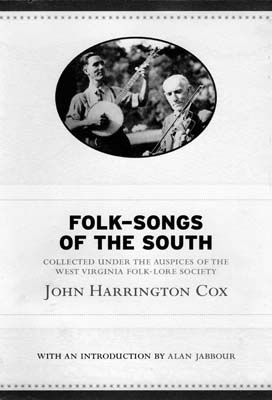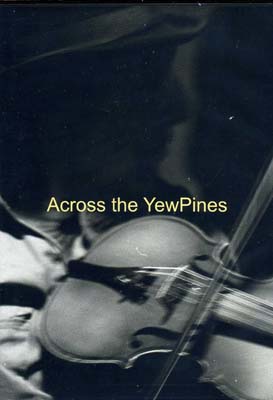Mountain Music Roundup
By John Lilly

In 1925, Harvard University Press issued a landmark collection of traditional folk songs from West Virginia titled Folk-Songs of the South. Recently West Virginia University Press has reissued this massive and influential volume as part of its West Virginia Classics series, sponsored in part by the West Virginia Humanities Council. More than 700 pages in length, this impressive group of songs and tunes was collected by members of the West Virginia Folk-Lore Society between 1915 and 1923, and was edited and assembled by West Virginia University English professor John Harrington Cox.
Cox, an Illinois native born in 1863, was an authority on medieval literature. He came to Morgantown in 1903, where he became the state’s preeminent folklorist. In 1913, a student gave him a copy of the lyrics to the folk ballad “John Hardy,” about a real-life incident that took place in McDowell County in the 1890’s. Hardy, a black railroad worker from the Welch area, was convicted and hanged for the murder of Tom Bruce, another black man, in a drunken argument over a few cents. [See “John Hardy: The Man and the Song,” by Richard Ramella; Spring 1992.] Fascinated, Cox sent the text to Professor George Lyman Kittredge at Harvard, who promptly published it in the Journal of American Folk-Lore. This according to Cox, was the beginning of the West Virginia Folk-Lore collection.
In 1915, visiting lecturer C. Alphonso Smith founded the West Virginia Folk-Lore Society. Cox was declared the president. The Society’s mission was to gather or to help Cox gather ballads, folksongs, and folklore of West Virginia, and their efforts were prodigious. By 1923, the Society and Cox had assembled more than 200 songs and tunes, most with numerous alternate versions and variations, from around the state. Their publication was considered a major event in the field of folklore studies and served as the model for dozens of subsequent works from around the country. The book also helped to establish West Virginia as a central repository of old English ballads and frontier songs and tunes.
This 2013 edition includes the complete work from 1925 along with a new introduction by Alan Jabbour, respected folklorist and former director of the American Folklife Center at the Library of Congress. Jabbour points out the connection between Cox’s work and the seminal research and documentation of Harvard University professor Francis James Child. According to Jabbour, Child’s “monumental and multi-volume work, The English and Scottish Popular Ballads (1882-98), became the benchmark scholarly edition for the older stratum of traditional ballads in the English language.”
Cox makes steady reference to the “Child ballads,” as they have come to be known, in his notes and commentaries on the West Virginia materials. Indeed, the first 33 songs in this collection are subtitled with their Child ballad numbers: for example “Lord Randal (Child, No. 12).” Cox goes on to point out 12 West Virginia variants of this old British chestnut, and details their relationship to the Child ballad and its variants.
These initial 33 songs underscore the often-discussed connection between Appalachian balladry and medieval English literature. Lords, ladies, squires, and knights populate these ancient songs, most of which are tragic in the extreme. Traditionally sung unaccompanied and often having a dozen or more verses each, they are generally based on narrative accounts involving topics such as heartbreak, betrayal, murder, valor, or ghosts – ironically some older ballad singers call them “love songs.”
Cox also presents a significant amount of uniquely American material. This includes the aforementioned John Hardy (in nine variants), as well as songs about Jesse James, Davy Crockett, Jeff Davis, cowboys, rebel soldiers, slaves, train wrecks, and treacherous women. The Civil War, the Wild West, and local tragedies are all well-represented, as are children’s songs and nursery rhymes.
The predominance of this book lies in the lyrical content of these songs, reflecting perhaps Cox’s professional life as an English teacher and a literary scholar. He received his doctorate from Harvard in 1923; this book was his thesis.
While words are the focus here, basic melodies are included for 29 tunes. An index of song titles and first lines is also included.
The people at WVU Press are to be commended for bringing this book back into print, as are Ken Sullivan and the others at the West Virginia Humanities Council for their vision and support. For better or for worse, today’s generation of folk musicians place their primary emphasis on instrumental music. Those who do sing traditional songs draw from early recordings of string band and country music, relying almost entirely on repertoire involving guitars and other accompaniment. The old style of unaccompanied singing is fast fading. Perhaps this book will help to spark renewed interest in these old songs and the dynamic and colorful stories they tell.
Folk-Songs of the South is a 704-page hardbound edition. It sells for $29.99 – an incredible bargain! – plus in-state sales tax and shipping, from WVU Press. To order visit www.wvupress.com, or phone 1-800-621-2736.
The Hammons family of east-central West Virginia are legendary among those who seek the most soulful and archaic strains of mountain music and song. Over the years several attempts have been made to document and present this extended family along with their stories and repertoire, including at least one film, a boxed set from Smithsonian Folkways Records, and numerous field recordings, articles, and academic papers.
All of that pales in comparison to a new five-CD package developed by Hillsboro resident Dwight Diller and independently released with support and assistance from the West Virginia Humanities Council.

Across the Yew Pines - The Hammonses: Descendants of the Frontier is a monumental project. Dwight became acquainted with several members of the Hammons family in the late 1960’s and chose to take a sabbatical from his college studies to immerse himself in their lives, stories, and music. He began by recording and learning many of the traditional mountain tunes on banjo and fiddle from Burl, Lee, and Sherman Hammons, as well as unaccompanied songs from Maggie Hammons Parker.
He soon discovered, however, that music was merely a portal into a way of life that was nearly gone. Dwight stayed with the family, slept on their couch, worked with them in the fields and around the farm, learned their family stories and legends, and, most importantly, absorbed the spirituality and heartfelt philosophies that sustained them in their rustic lifestyle.
Dwight shared his discoveries with others, who came on the weekends then returned to their modern lives. But Dwight never went back. Over the years he amassed hundreds of hours of documentary materials, took thousands of photographs, and learned countless tunes and songs. Across the Yew Pines is the result of Dwight’s 40-year quest to bring the Hammons family and his experience with them to anyone who shares his interest in this salt-of-the-earth family.
The five DVD’s included here provide a library of material pertaining to the Hammons family. Three DVD’s contain audio recordings collected by Dwight of various family members speaking, singing, or playing instrumental music on the fiddle or banjo, illustrated with still photography and video footage. They share family history, legends and ghost tales, humorous anecdotes, as well as explanations of some of the musical selections.
One of the DVD’s includes transcriptions of the spoken text, which is helpful in gaining a clearer understanding of the speakers and their rather pronounced accents and localized vocabularies. This disk also offers banjo tablature for those who wish to learn some of the music, as well as tune and song lists, family history, analysis, commentary, and acknowledgements.
Disk four features additional film footage, including a 1972 documentary from Lois Tupper and Maureen McCue, titled Fine Times at Our House, showing the Hammonses as they were around the time when Dwight first encountered them. It is especially interesting to see film footage of Dwight himself as a young man doing farm work and interacting with his mentors. This final disk concludes with a very poetic monolog from Dwight, comparing mountain music to the rhythm and flow of the natural world.
There is admittedly more information here than most people will find the opportunity to enjoy. But there is plenty for anyone to see and hear in order to gain a personal understanding of not only the legendary Hammons family, but of Dwight Diller – himself a West Virginia musical treasure. He is to be congratulated, as well as Gail Hatton, the Pocahontas County Free Library, the West Virginia Humanities Council, and the others who assisted him in this worthy project.
Across the Yew Pines is not for sale; it is being distributed free of charge to all West Virginia public and academic libraries. For additional information, contact Vicky Terry at (304)799-6000; e-mail [email protected].
You can read the rest of this article in this issue of Goldenseal, available in bookstores, libraries or direct from Goldenseal.